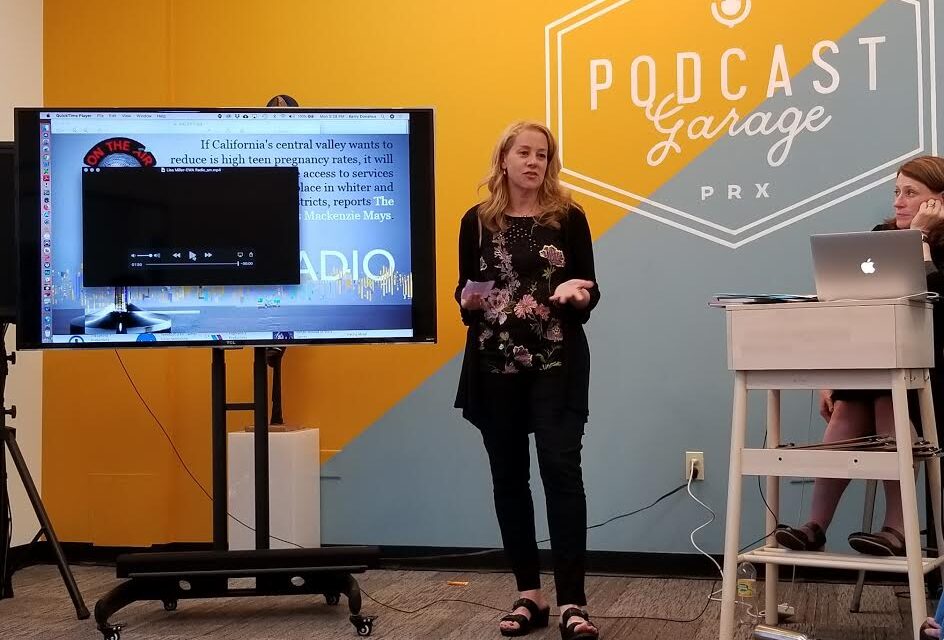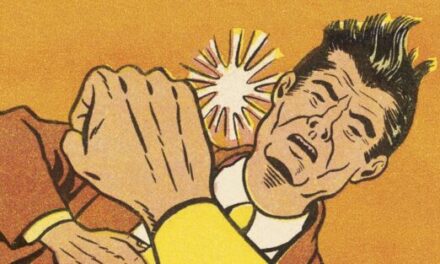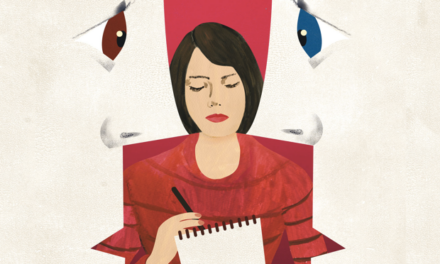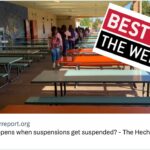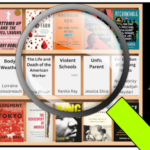The Education Writers Association’s public editor discusses her unconventional role in a far-ranging interview.
Feature image credit Linda Lutton
By Alexander Russo
For the past seven years, Emily Richmond has been the public editor – and to some extent the public face – of the Education Writers Association (EWA), the national nonprofit that supports local and national education journalists.
In her main role as EWA’s public editor, she works with EWA journalist members who approach her for ideas, advice, and storytelling tips. It’s not the traditional public editor function, which is to address journalistic concerns and provide accountability to the public. But it’s a valuable coaching and mentoring role, putting Richmond in regular, close contact with education reporters who may be new to the beat or may not have the support and mentorship that newsrooms used to provide.
Before coming to EWA, Richmond covered education for the Las Vegas Sun for eight years, reporting on the nation’s fifth-largest school district. She was also a 2011 Knight-Wallace Fellow at the University of Michigan. She succeeded Linda Perlstein, the former Washington Post reporter and author who inaugurated the job a decade ago.
In this new interview, Richmond reflects on what she’s learned in her previous and current roles, how newsrooms have changed, the pleasures of podcasting, and what stories we’re likely to see this summer and fall. For a 2008 interview with Perlstein, see here.
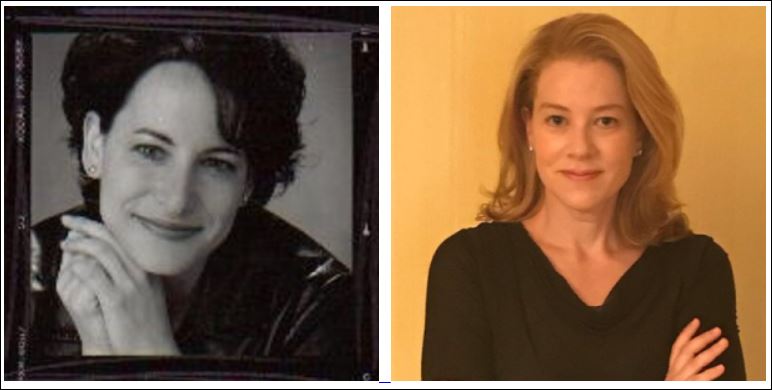
EWA public editors, past and present: Perlstein (left), and Richmond (right)
What is that you do as EWA’s public editor?
Emily Richmond: My first priority is to support our journalist members, and that takes a lot of different forms these days, including one-on-one support and coaching to any member who needs it. I also host the EWA Radio podcast, write for the blog, contribute to online programming and in-person events, and oversee the New to the Beat and Reporting Fellowship programs.
What you do is different from how other folks with the same title do the job, right?
ER: I’m not a critic. I offer critiques, but they are on request and they’re private. My job is not to shame anyone or to call someone out or to say here’s the best and the worst. I need to be a resource and support for anyone who needs that. To be a presence that people can trust. That requires me to be as neutral as possible. It’s certainly challenging, but if I can help them, it’s a lot better than if I tell them what they’re doing wrong.
Related coverage: Mentorship moments that changed these education journalists’ trajectories
“My job is not to shame anyone or to call someone out or to say here’s the best and the worst. I need to be a resource and support for anyone who needs that. To be a presence that people can trust. That requires me to be as neutral as possible.”
What’s the hardest part of the job?
ER: Trying to stay ahead of what we think reporters are going to need six months from now, as we head into planning for next year’s conference. It’s also a challenge being responsive to game-changers and making changes to what we do to make sure we’re giving our members the most useful and forward-looking programming we can.
What’s the most fun?
ER: Working one on one with reporters. Journalism is a helping profession and working with reporters helps me feel connected to the newsroom. They’re sharing with me their challenges and successes. It’s invigorating, and I get to share what they learn with others, and then see that chain reaction effect of their stories encouraging more stories.
What about the weekly podcast, now going on two years?
ER: I love doing EWA Radio. It’s a real blast for me, like talking to a colleague in the newsroom pod next to yours. [Richmond cites this June interview with Chicago Sun-Times reporter Lauren Fitzpatrick on Chicago public schools’ custodial and facilities maintenance services as “a master class in beat reporting.”]
Where did the idea of a weekly podcast interview come from – and what does it do that’s different?
ER: At National Seminar, our “How I Did the Story” sessions, featuring finalists for EWA Awards, are always hugely popular. It’s a terrific opportunity for reporters to share the backstory to their work. The drawback was that it happened only once a year, and we only had room to showcase three or four reporters each from K-12 and higher ed. The podcast lets us ask more reporters to share their craft and help their colleagues improve their own coverage.
Related coverage: So you think you want to make an education podcast?
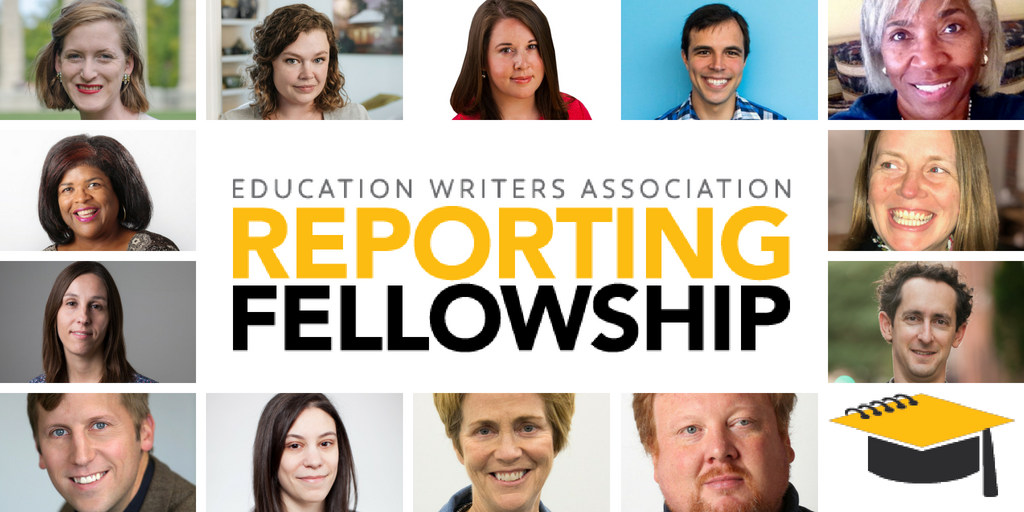
The latest crop of EWA Reporting Fellows, announced earlier this week.
How has the reporting fellowship program changed over the past few years, and what are its biggest accomplishments?
ER: We’re seeing more reporters who are looking for financial support to buy them time to invest in an in-depth reporting project or for a specific kind of outside expertise like psychometrics. The beat is busier than ever, and our members want to push the envelope in their reporting rather than just doing a bigger version of what would otherwise have been a Sunday takeout or a two-part series. [To see the brand new crop of fellows, click here.]
Looking back, what do you think were your weaknesses as an education reporter?
ER: I look back at my days covering the beat and there are so many ways I could have done a more informed job, particularly when it comes to covering communities of color and accessing public records. It’s very easy to get bogged down in day-to-day stories.
I covered Clark County, the nation’s fifth-largest school district, as well as Nevada’s statewide higher education system. It would have been good to step back more often and look at how underserved student populations were faring at the student and classroom level, not just tying those pieces to big events like a statewide accountability report card. I should have been more proactive — and less reactive — on open records requests. I have tremendous admiration for our members who really know how to mine the beat on that front.
What about your strengths?
ER: I have empathy for my greener self. There was a lot to juggle, and, like many reporters, I was learning on the job. That being said, I think I was pretty good at sifting through the minutiae to find the meat. I saw the bi-weekly school board meeting as an opportunity, not an agony. I was always curious, which served me well. And my patience also served me well, especially when it meant pushing a little harder to get a really good third-day story.
I was fortunate to have editors who encouraged me to find innovative profiles — an attendance officer chasing after truants and a high school principal who heads to a national science teacher convention to recruit new talent. Those are both examples of perennial problems faced by many districts. It was a great learning experience to see those challenges from the inside out.
“I look back at my days covering the beat and there are so many ways I could have done a more informed job, particularly when it comes to covering communities of color and accessing public records.”
What have been some of the big lessons you’ve learned since you began on the public editor job?
ER: Reporters don’t just want to know about a particular topic, they want the time and resources to help them put that story into action. We’re not the reference desk librarian – although they provide very important assistance. We have to go down another level, helping them find the ideas and approaches to take to their editors and shape what they do. When I first took the job, I saw myself more in that reference librarian role. It’s evolved.
How did you come to learn that reporters wanted more or different kinds of help, and what does that look like in practical terms?
ER: Each year I hear more from reporters who might be brand-new not only to education reporting but to journalism, who want help with everything from breaking down a school district’s budget to figuring out how to navigate access to classrooms. That was the impetus for “New to the Beat.” But also over the past few years, we’ve had a growing number of members who want to take on bigger projects but need additional resources to make it happen or to persuade an editor to give them the time away from the regular newsroom duties. That’s how the EWA Reporting Fellowships first evolved.
Related coverage: Fixing the fellowship model
“We’re not the reference desk librarian – although they provide very important assistance. We have to go down another level, helping them find the ideas and approaches to take to their editors and shape what they do.”
What are the big challenges and opportunities for education journalism right now?
ER: The 24-hour news cycle can be draining for reporters and their audiences. There’s a risk of compassion fatigue. I used to regret that there are so many reporters trying to juggle K-12 and higher ed, but I’m now seeing that for some reporters as an opportunity to see the P-16 pipeline. And I haven’t made up my mind yet about Twitter.
What did you make of Amanda Ripley’s recent and much-discussed article on the dangers of oversimplification in journalism, Complicating the Narratives?
ER: These are not easy conversations. But if a reporter as experienced and talented as Amanda can say, ‘Here’s what I’ve never done,’ it behooves all of us to read and process this… [And] there are also things that she’s suggested that reporters could implement immediately, without reinventing the wheel, like asking some of the questions she suggests, like ‘How did you come to hold this belief?’ A reporter working on a school choice article could ask a source that question instead of just describing someone as a choice advocate or critic. And the answers could be really revealing.
What do you miss about doing your own journalism? Do you ever think about going back?
ER: I miss being in a newsroom. But the newsroom that I experienced doesn’t exist anymore. The news landscape has changed. So I feel fortunate to be connected to the daily work of the beat through EWA members.
What’s so different now, besides the scarcity of jobs?
ER: Not all the changes are negative. Digital reporting tools are helping a lot of reporters get information more quickly and do more to break it down for their audiences. On the human front, we’re also seeing more student and parent voices in stories. But at the same time, there’s real concern at all levels of the beat — from local to regional to national reporters — about access. This can be a superintendent who issues a blanket injunction barring reporters from contacting principals directly or the Education Secretary holding listening sessions for the new federal school safety task force that are closed to the press. These kinds of situations certainly predate the Trump administration — but they’re significant issues that need to be addressed.
What are the coverage trends you see ahead in education journalism?
ER: There is always a chain effect when a story breaks through. In the past, there’s been lots of discussion of Nikole Hannah-Jones spurring coverage of school segregation, and that’s a good example. But Bethany Barnes’ recent story on school threat assessments is a more recent instance. I think we’re going to see a lot of those stories in the next year.
I also think we’re going to see more crossover stories in other beats, whether it’s writing about postsecondary education that’s more closely connected to industries and communities, or writing that looks at education and health.
I also see more stories coming out based on highly targeted, micro aspects of education like EdBuild [focused on school funding] and Attendance Works [focused on school attendance]. That kind of research can be the backbone to strong and useful reporting.
You can find Richmond at @EWAEmily – be prepared for lots of helpful tips, dog pics, and GIFs.
Previous interview columns:
Edtech writer Audrey Watters shares thoughts on education journalism
Edtech coverage, the hype cycle, and media complicity (interview with Doug Levin)
ABOUT THE AUTHOR

Alexander Russo
Alexander Russo is founder and editor of The Grade, an award-winning effort to help improve media coverage of education issues. He’s also a Spencer Education Journalism Fellowship winner and a book author. You can reach him at @alexanderrusso.
Visit their website at: https://the-grade.org/

